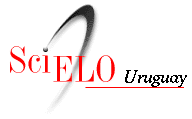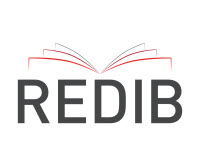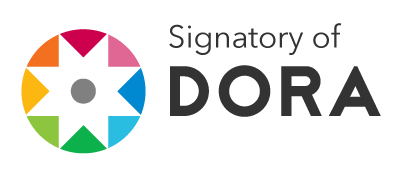Organización del Conocimiento y Terminología: intersecciones, interlocuciones y proyecciones
Resumen
El objetivo de este trabajo es explorar el espacio de intersección existente entre organización del Conocimiento (KO) y terminología, con la intención de identificar los elementos teóricos y metodológicos de un campo que han sido reconocidos como posibles contribuciones, en el otro campo. La investigación es cualitativa. Se estableció como unidad de análisis el espacio de intersección conceptual, metodológica y práctica entre KO y terminología. Se seleccionaron cinco variables: reconocimiento del espacio de intersección por los autores; identificación de fundamentos comunes o similares; teorías identificadas; metodologías identificadas; y, dirección de la influencia teórica y/o metodológica, de un campo a otro. Para cada variable se seleccionaron varios indicadores. Se constituyó un corpus ad hoc para la investigación. Entre otras consideraciones finales, se comprueba que ambos campos desarrollan actividades de representación y organización temática del conocimiento, aunque con perspectivas y objetivos diferentes. Es más evidente la influencia de la terminología sobre KO que a la inversa. El estado actual de intercambio (teórico, metodológico, aplicativo), está aún en estado embrionario, aunque hay evidencia de un potencial importante de desarrollo de pensamiento teórico y de métodos que han demostrado ser eficaces en un campo, para ofrecer nuevas soluciones a los problemas pendientes en el otro.
Descargas
Citas
Abbas, J. (2010). Structures for Organizing Knowledge Exploring Taxonomies, Ontologies, and Other Schemas. Chicago: Neal-Schuman Publishers
Alexiev B. (2006). Terminology Structuring for Learner’s Glossaries. Knowledge Organization, 33 (2), 96-118.
Alexiev, B., and Marksbury, N. (2010). “Terminology as Organized knowledge”. Paradigms and Conceptual Systems in Knowledge Organization Proceedings of the Eleventh International ISKO Conference 23-26 February 2010 Rome, Italy Organized by the Italian Chapter of ISKO and the Faculty of Philosophy, Sapienza University of Rome Edited by Claudio Gnoli and Fulvio Mazzocchi. Advances in Knowledge Organization, vol. 12, pp 363-70.
Alpízar, (1997) ¿Cómo Hacer un Diccionario Científico-Técnico? Buenos Aires: Memphis.
Álvarez Catalá, S., and Barité, M. (2017). Teoría y praxis en Terminología. Montevideo: CSIC.
Antia, B:E. (2000). Terminology and Language Planning: An Alternative Framework of Practice and Discourse. Amsterdam; Philadelphia, PA: John Benjamins.
Arntz, R., and Picht, H. (1995). Introducción a la Terminología. Madrid: Fundación Germán Sánchez Ruipérez ; Pirámide.
Auger, P., and Rousseau, L.J. (1988). Méthodologie de la Recherche Terminologique. Québec: Office de la Langue Française.
Barát, A. H. (2012). Dynamism of Knowledge Organization, Particularly its Relation to UDC. In 20 años del Capítulo Español de ISKO: actas del XX Congreso ISKO-España. Ferrol, 30 de junio-1 de julio de 2011 (pp. 337-51). Ferrol: Servizo de Publicacións.
Barité, M. (2018). Literary Warrant. Knowledge Organization, 45(6), 517-36. DOI:10.5771/ 0943-7444-2018-6-517
Barité, M., Parentelli, V., Rodríguez Casaballe, N., and Suárez, M.V. (2023). Interdisciplinarity and Postgraduate Teaching of Knowledge Organization (KO): Elements for a Necessary Dialogue. Knowledge Organization, 50(3), 227-41.
Beghtol, C. (2002). Universal Concepts, Cultural Warrant and Cultural Hospitality. Advances in Knowledge Organization, 8, 45-49.
Beghtol, C. (1986). Semantic Validity: Concepts of Warrant in Bilbliographic Classification Systems. Library Resources & Technical Services, 30(2), 109-23.
Berg, J. (1982). Aristotle’s Theory of Definition. ATTI del Convegno Internazionale di Storia della Logica, (19-30).
Bevilacqua, C.R. (2017). Investigación Sistemática en Terminología. In Álvarez Catalá, S., and Barité, M. (Eds.). Teoría y Praxis en Terminología (pp. 69-90). Montevideo: CSIC.
Braz, Márcia Ivo (2020). Panorama das Contribuições da Terminologia para a Organização do Conhecimento: uma Análise das Teses e Dissertações no Brasil a partir da Teoria da Complexidade. (Doctoral Thesis). Pernambuco: Universidade Católica de Pernambuco.
British Standards Institution. 2005-2008. Structured Vocabularies for Information Retrieval: BS 8723-.S.l.: BSI.
Budin, G.; Galinski, Ch.; Nedobity, W.; Thaller, R. (1988). Terminology and Knowledge Processing. Infoterm, (1).
Cabré, M. T. (2017). Contexto y Evolución de la Terminología: De una Aproximación Nominalista a una Teoría Comunicativa. In Álvarez Catalá, S., and Barité, M. (Eds.). Teoría y Praxis en Terminología (pp. 9-22). Montevideo: CSIC.
Cabré, M. T. (1999). Terminología: Representación y Comunicación: Elementos para una teoría de base comunicativa y otros artículos. Barcelona: Universitat Pompeu Fabra.
Cabré, M. T. (1993). La terminología: Teoría, Metodología, Aplicaciones. Barcelona: Empúries. Campos, M. L. de A. (2001). Linguagem Documentária: Teorias que Fundamentam sua Elaboração. Niteroi: EdUFF.
Célestin, T.; Godbout, G., and Vachon-L’Hereux, P. (1984). Méthodologie de la Recherche Terminologique Ponctuelle. Québec: Office de la Langue Française
Dahlberg, I. (2006). Knowledge Organization: A New Science? Knowledge Organization, 33(1), 11-19.
De Bessé, B., Nkwenti-Azeh, B., and Sager, J.C. (1997). Glossary of Terms used in Terminology. Terminology, 4(1), 117-56.
Diki-Kidiri, Marcel (ed.). (2008). Vocabulaires Scientifiques en Langues Africaines: pour une Approche Culturelle de la Terminologie. Paris: Karthala.
Espelt, C. (1995). Bases Teóricas en la Enseñanza de los Lenguajes Documentales. In Organización del Conocimiento en Sistemas de Información y Documentación. Actas del I Encuentro de ISKO-España, Madrid 4/5 noviembre 1993, pp. 125-134. Zaragoza: Universidad de Zaragoza.
Faber, P., and López Rodríguez, C.I. (2012). Terminology and Specialized Language. In Faber, P. (ed.). A Cognitive Linguistics View of Terminology and Specialized Language (pp. 9-31). Berlin, Germany: Walter de Gruyter.
Fedor de Diego, A. (1995). Terminología: Teoria y práctica. Caracas: Universidad Simón Bolívar ; Unión Latina.
Felber, H. (1984). Terminology Manual. Paris: Unesco.
Filsinger, (2020). Evolución Diacrónica de la Terminología y Disciplinas en Contacto. Tonos Digital, 39, 1-25.
Gaudin, F. (1993). Pour une Socioterminologie: Des Problèmmes Semantiques aux Pratiques Institutionelles. Rouen: Université de Rouen.
Guimarães, J. A. C. (2017). Organização do Conhecimento: Passado, Presente e Futuro sob a Perspectiva da ISKO. Informação & Informação, 22(2), 84–98. https://doi.org/10.5433/1981-8920.2017v22n2p84
Hjørland, B. (2023). Terminology. Knowledge Organization 50(2): 111-127. Also available in ISKO Encyclopedia of Knowledge Organization, Hjørland, B., and Gnoli, C. (Eds.), https://www.isko.org/cyclo/terminology
Hjørland, B. (2002). Domain Analysis in Information Science: Eleven Approaches - Traditional as Well as Innovative. Journal of Documentation, 58, 422-62.
Hodge, G. (2000). Systems of Knowledge Organization for Digital Libraries: Beyond Traditional Authority Files. Washington D.C.: Council on Library and Information Resources. http://www.clir.org/pubs/reports/pub91/contents.html
International Organization for Standardization (2011-2013). Information and Documentation: Thesauri and Interoperability with other Vocabularies: ISO 25964-1: ISO 25964-2. Vernier: ISO.
International Organization for Standardization (1987a). Norme 704: Principes et Méthodes de la Terminologie. (S.l.) : ISO.
International Organization for Standardization (1987b). Format d’échange sur Bande Magnétique des Données Terminologiques et/ou Lexicographiques (MATER): ISO 6156. (S.l.) : ISO.
Iyer, H. (2012). Classificatory Structures: Concepts, Relations and Representation. Würzburg: Ergon.
Krieger, M. da G., and Finatto, M. J. B. (2004). Introdução à Terminología: Teoría e Prática. São Paulo: Contexto.
Maniez, J. (1977). Terminologie et Thésaurus: Divergences et Convergences? In Terminologies 76: Colloque international, Paris-La Défense, 15-18 juin 1976. Paris, (pp. IV39-IV50). París: La Maison du Dictionnaire.
Moreiro-González, J. A. (2019). La Bibliotecología y Documentación en su Cruce con otras Disciplinas: Su Importancia para la Organización del Conocimiento. Letras, Lima, 90(132), 167-87. https://doi.org/10.30920/letras.90.132.7
National Information Standards Organization (2010). Guidelines for the Construction, Format, and Management of Monolingual Controlled Vocabularies: ANSI/NISO Z39.19-2005. Bethesda: NISO Press, approved July 2005.
https://www.niso.org/publications/ansiniso-z3919-2005-r2010
Nedobity, W. (1983). Terminology and its Application to Classification, Indexing and Abstracting. UNESCO. Journal of Information Science, Librarianship and Archives Administration, 4, 227-34.
Raghavan, K.S., and Krishnamurthy, M. (2013). An Overview of Classification Technologies. Journal of Library & Information Technology, 33(4), 306-13
Ridenour, L., and Smiraglia, R. P. (2016). How Interdisciplinary is Knowledge Organization?: An Epistemological View of Knowledge Organization as a Domain. In Knowledge Organization for a Sustainable World: Challenges and Perspectives for Cultural, Scientific, and Technological Sharing in a Connected Society (pp. 43-50). Würzug: Ergon-Verlag.
Sager, J. C. (1990) A Practical Course in Terminology Processing. Amsterdam; Philadelphia, PA: John Benjamins.
Salatino, A., Aggarwal, T., Mannocci, A., Osborne, F., and Motta, E. (2024). A Survey on Knowledge Organization Systems of Research Fields: Resources and challenges. arXiv preprint arXiv:2409.04432.
Smiraglia, R. P. (2012). Knowledge Organization: Some Trends in an Emergent Domain. El Profesional de la Información, 21(3), 225-227. http://dx.doi.org/10.3145/epi.2012.may.01
Soergel, D. (2009). Knowledge organization Systems: Overview, 1-44. http://www.dsoergel.com/SoergelKOSOverview.pdf
Szostak, R., Gnoli, C., and López-Huertas, M. (2014). Interdisciplinary Knowledge Organization. Suiza: Springer.
Temmerman, R. (2000). Towards New Ways of Terminology Description: The sociocognitive approach. Amsterdam/Philadelphia.
Van der Laan, R. (2002). Tesauro e Terminologia: uma Interrelação Lógica. (Doctoral Thesis). Porto Alegre: UFRGS.
Woźniak-Kasperek, J. (2014). Terminology as a Picture of Knowledge Organization in a Scientific Discipline. In Babik, W. (Ed.). Knowledge Organization in the 21st Century: Between Historial Patterns and Future Prospects. Proceedings of the 13th International ISKO Conference, Krakow, Poland, 19-22 May. 2014. Organization, vol. 14. (pp. 305-311). Würzburg: Ergon Verlag.
Wüster, E. (1970). Internationale Sprachnormung in der Technik, Besonders in der Electrotechnik. 3ª ed. revisada. Bonn: Bouvier,
Zheng, J. (2022). A Review and Methodological Reflection on Knowledge Organization Studies. In 8th International Conference on Education, Language, Art and Inter-cultural Communication (ICELAIC 2021) (pp. 148-156). Atlantis Press.
Derechos de autor 2025 Mario Barité

Esta obra está bajo licencia internacional Creative Commons Reconocimiento 4.0.







.jpg)




















